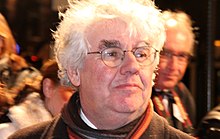
Leiden University is a public research university in Leiden, Netherlands. It was founded as a Protestant university in 1575 by William, Prince of Orange, making it the oldest institution of higher education in the Netherlands.

The Royal Palace of Amsterdam in Amsterdam is one of three palaces in the Netherlands which are at the disposal of the monarch by Act of Parliament. It is situated on the west side of Dam Square in the centre of Amsterdam, opposite the War Memorial and next to the Nieuwe Kerk.
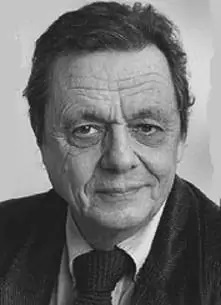
François Furet was a French historian and president of the Saint-Simon Foundation, best known for his books on the French Revolution. From 1985 to 1997, Furet was a professor of French history at the University of Chicago.

Amsterdam Centraal station is the largest railway station in Amsterdam, North Holland, the Netherlands. A major international railway hub, it is used by 192,000 passengers a day, making it the second busiest railway station in the country after Utrecht Centraal and the most visited Rijksmonument of the Netherlands.
De Groene Amsterdammer is an independent Dutch weekly news magazine published in Amsterdam. It is one of the four independent opinion magazines in the Netherlands, alongside HP/De Tijd, Vrij Nederland and Elsevier.

Sir Christopher Munro Clark is an Australian historian living in the United Kingdom and Germany. He is the twenty-second Regius Professor of History at the University of Cambridge. In the 2015 Birthday Honours, he was knighted for his services to Anglo-German relations.
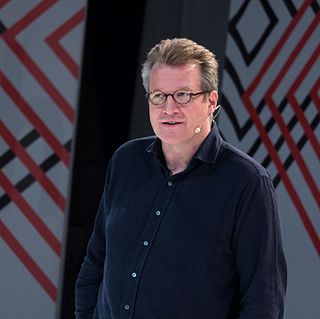
Philipp Blom is a German historian, novelist, journalist and translator.

The Leipzig Book Fair is the second largest book fair in Germany after the Frankfurt Book Fair. The fair takes place annually over four days at the Leipzig Trade Fairground in the northern part of Leipzig, Saxony. It is the first large trade meeting of the year and as such it plays an important role in the market and is often where new publications are first presented.

Karl-Markus Gauß is an Austrian contemporary writer, essayist and editor. He lives in Salzburg.
The Leipzig Book Fair Prize is a literary award assigned annually during the Leipzig Book Fair to outstanding newly released literary works in the categories "Fiction", "Non-fiction" and "Translation". The Leipzig Book Fair Prize has been awarded since the Deutscher Bücherpreis was ceased in 2005, and is one of the most important literary awards in Germany. The winner in each category is awarded €15,000.

Prince Bernhard of Lippe-Biesterfeld was a German nobleman who was Prince consort of the Netherlands from 6 September 1948 to 30 April 1980 as the husband of Queen Juliana. They were the parents of four children, including Beatrix, who was Queen of the Netherlands from 1980 to 2013.
The trial of Geert Wilders, a member of the House of Representatives of the Netherlands, took place in the Netherlands in 2010 and 2011. Wilders was accused of criminally insulting religious and ethnic groups and inciting hatred and discrimination. He was found not guilty in June 2011.
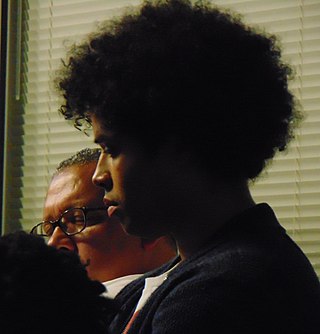
Johny Pitts is an English television presenter, writer and photographer from Firth Park, Sheffield.
Heinz Schilling is a German historian.
Fritz Klein, Jr. was a German Marxist historian specializing in the German Empire and debates on the Empire's role before, during, and after World War II. He was an official East German historian prior to German reunification in 1990. From 1979 to 1989, he served the Stasi as an informer under the codename "Wilhelm".

Hendrik Johannes Adrianus "Henk" Hofland was a Dutch journalist, commentator, essayist, and columnist. H.J.A. Hofland, as he is also commonly known, is often referred to as the éminence grise of Dutch journalism. In 1999 he was named Dutch "Journalist of the century" in a nationwide poll among his peers. He once described himself as belonging to the "anarcho-liberal community", though his political orientation is that of the secular center of society.

Eric John Ernest Hobsbawm was a British historian of the rise of industrial capitalism, socialism and nationalism. His best-known works include his tetralogy about what he called the "long 19th century" and the "short 20th century", and an edited volume that introduced the influential idea of "invented traditions". A life-long Marxist, his socio-political convictions influenced the character of his work.

Jan Białostocki was one of the most famous Polish art historians of the 20th century.
The City of Leipzig awards the Leipzig Book Award for European Understanding which has been given since 1994. The award is endowed with prize money of 20,000 Euro and is presented every year during the official opening of Leipzig Book Fair.
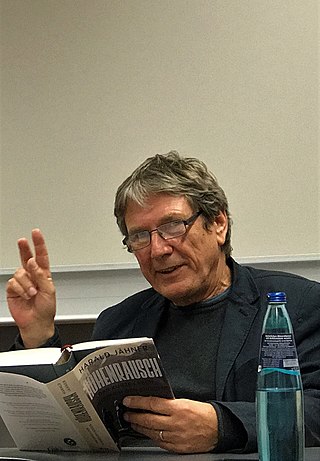
Harald Jähner is a German journalist and author. Since 2011 he has been an honorary professor of cultural journalism at the Berlin University of the Arts.
